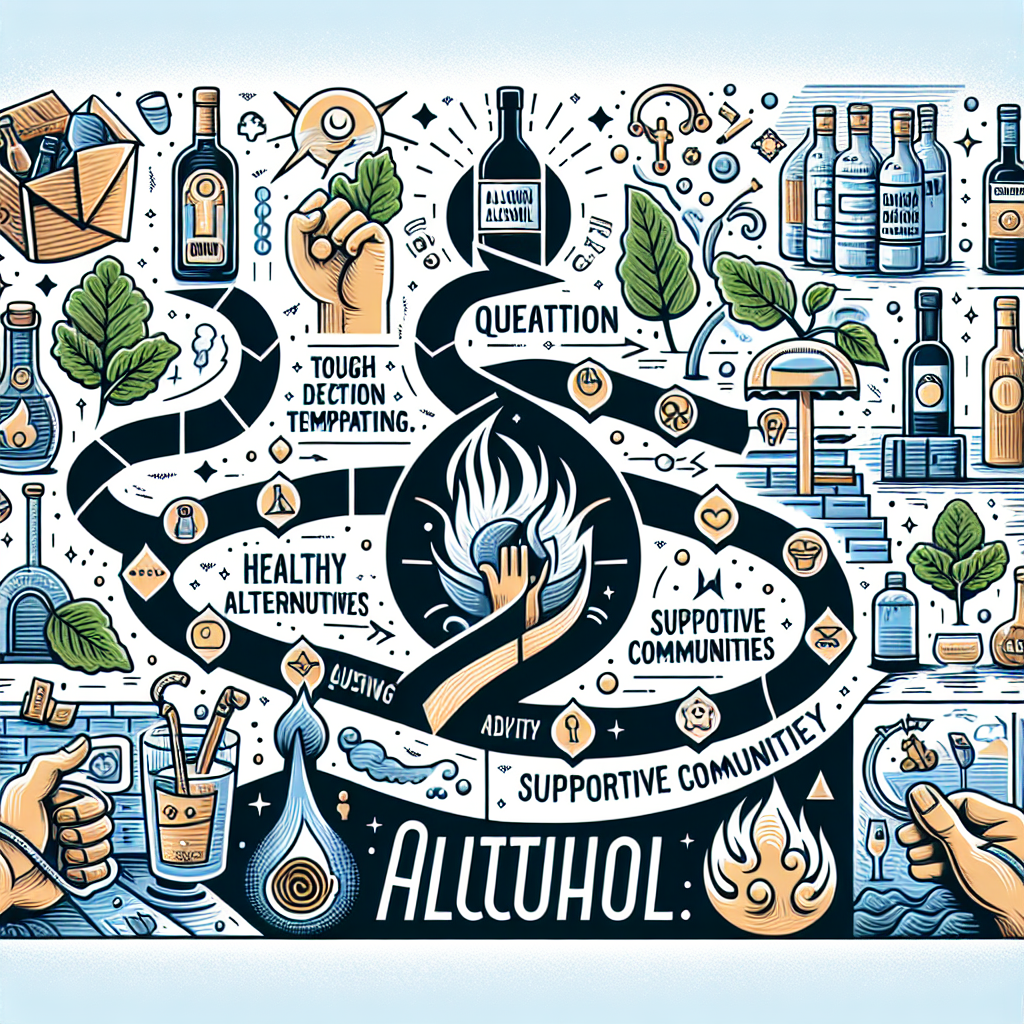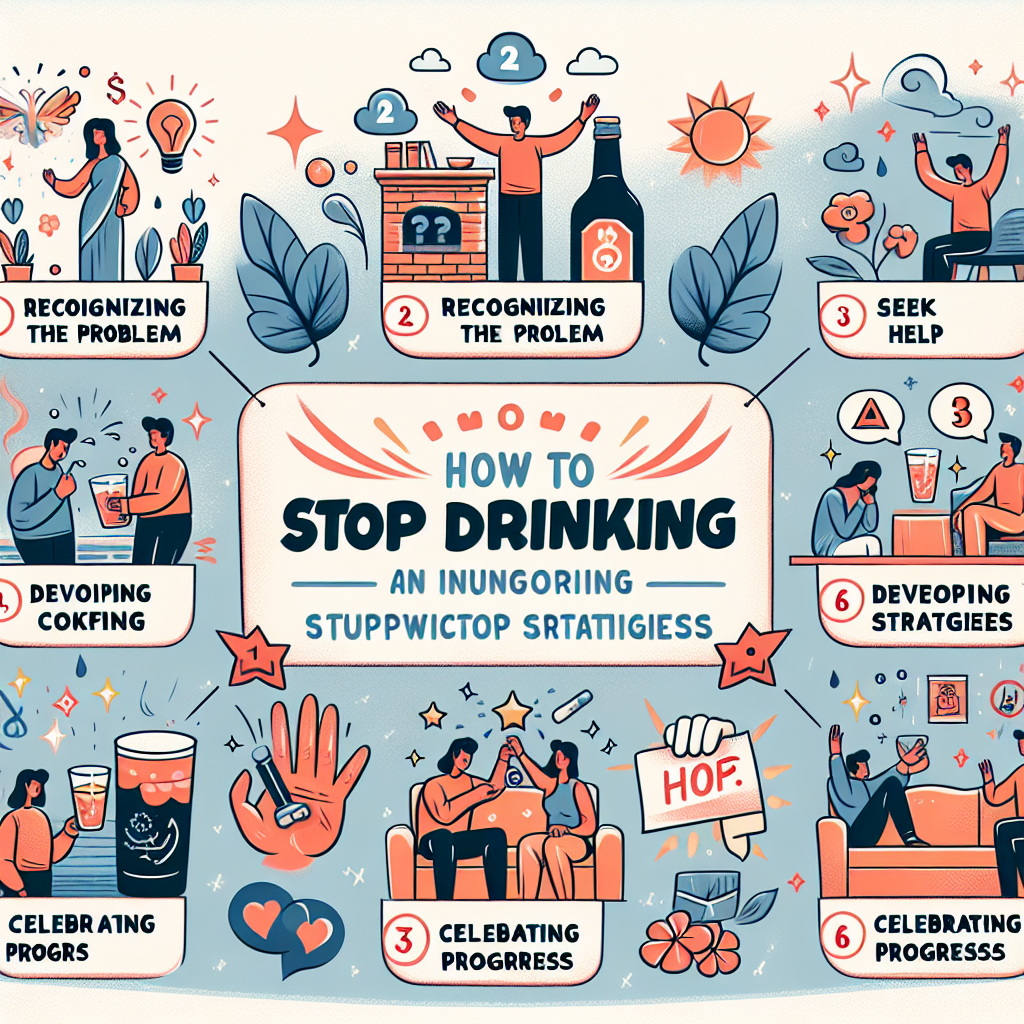-
Table of Contents

“Empower Your Sobriety: A Step-by-Step Guide to Quitting Alcohol”
Introduction
Quitting alcohol can be a challenging but rewarding journey. Whether you’re looking to cut back for health reasons, personal growth, or to regain control over your life, taking the first step is crucial. This guide provides a comprehensive, step-by-step approach to help you stop drinking. From understanding your motivations and setting clear goals, to finding support and developing healthier habits, this guide aims to equip you with the tools and strategies needed to achieve lasting sobriety. By following these steps, you can embark on a path toward a healthier, more fulfilling life free from the grip of alcohol.
Creating a Personalized Plan to Stop Drinking: A Step-by-Step Guide
Creating a personalized plan to stop drinking can be a transformative journey, one that requires dedication, self-awareness, and a structured approach. The first step in this journey is to acknowledge the need for change. Recognizing that alcohol has a negative impact on your life is crucial. This realization often comes from reflecting on how drinking affects your health, relationships, and overall well-being. Once you have acknowledged the problem, it is essential to set clear and achievable goals. These goals should be specific, measurable, and time-bound. For instance, you might decide to reduce your alcohol intake gradually over a month or quit entirely by a certain date.
After setting your goals, the next step is to identify your triggers. Triggers are situations, emotions, or people that prompt you to drink. By understanding what drives you to consume alcohol, you can develop strategies to avoid or cope with these triggers. For example, if stress is a significant trigger, you might explore alternative stress-relief methods such as exercise, meditation, or engaging in a hobby. Additionally, it is beneficial to create a supportive environment. Surround yourself with people who understand your goals and encourage your efforts. This support network can include friends, family, or support groups like Alcoholics Anonymous.
As you move forward, it is important to develop healthy habits to replace drinking. This might involve adopting a new routine that includes regular physical activity, a balanced diet, and sufficient sleep. Engaging in activities that bring you joy and fulfillment can also help fill the void left by alcohol. Moreover, keeping a journal to track your progress can be incredibly motivating. Writing down your thoughts, challenges, and successes allows you to reflect on your journey and stay committed to your goals.
In addition to these steps, seeking professional help can be a valuable part of your plan. Therapists, counselors, and medical professionals can provide guidance, support, and treatment options tailored to your needs. They can help you address underlying issues that contribute to your drinking and offer strategies to manage cravings and withdrawal symptoms. Medication may also be an option for some individuals, and a healthcare provider can discuss the potential benefits and risks.
As you implement your plan, it is crucial to be patient and compassionate with yourself. Change is a gradual process, and setbacks are a natural part of the journey. If you experience a relapse, do not view it as a failure but rather as an opportunity to learn and strengthen your resolve. Reflect on what led to the relapse and adjust your plan accordingly. Remember that every step forward, no matter how small, is progress.
Finally, celebrate your achievements along the way. Acknowledge the milestones you reach, whether it is a week without drinking or successfully navigating a social event without alcohol. Rewarding yourself for your hard work reinforces positive behavior and keeps you motivated.
In conclusion, creating a personalized plan to stop drinking involves a series of thoughtful and deliberate steps. By acknowledging the need for change, setting clear goals, identifying triggers, building a support network, developing healthy habits, seeking professional help, and practicing self-compassion, you can embark on a successful journey towards sobriety. Each step you take brings you closer to a healthier, more fulfilling life free from the constraints of alcohol.
Overcoming Alcohol Addiction: Practical Steps to Quit Drinking
Overcoming alcohol addiction is a challenging journey, but with determination and the right strategies, it is entirely possible to reclaim control over your life. The first step in this transformative process is acknowledging the problem. Recognizing that alcohol has a detrimental impact on your health, relationships, and overall well-being is crucial. This self-awareness lays the foundation for meaningful change and sets the stage for the steps that follow.
Once you have acknowledged the issue, setting clear and realistic goals is essential. Decide whether you want to reduce your alcohol intake or quit entirely. Establishing specific, measurable, and attainable goals will provide you with a sense of direction and purpose. For instance, you might aim to cut down your drinking gradually over a few weeks or set a date to stop drinking altogether. Having a clear plan in place can make the process less overwhelming and more manageable.
Seeking support is another vital component of overcoming alcohol addiction. Sharing your goals with trusted friends, family members, or support groups can provide you with the encouragement and accountability you need. These individuals can offer emotional support, practical advice, and a listening ear during difficult times. Additionally, professional help from therapists, counselors, or addiction specialists can provide you with tailored strategies and coping mechanisms to navigate the challenges of quitting alcohol.
As you embark on this journey, it is important to identify and avoid triggers that may lead to drinking. Triggers can be people, places, or situations that prompt the urge to drink. By recognizing these triggers, you can develop strategies to avoid or cope with them. For example, if social gatherings with heavy drinking are a trigger, consider attending events where alcohol is not the focus or spending time with friends who support your decision to quit. Developing new, healthy habits and hobbies can also help fill the void left by alcohol and provide a positive outlet for your energy and emotions.
In addition to avoiding triggers, building a strong support network is crucial. Surround yourself with people who understand and respect your decision to quit drinking. This network can include friends, family, support groups, or online communities. Engaging with others who have successfully overcome alcohol addiction can provide you with valuable insights, inspiration, and a sense of camaraderie. Knowing that you are not alone in your journey can be incredibly empowering and motivating.
Moreover, taking care of your physical and mental health is essential during this process. Regular exercise, a balanced diet, and sufficient sleep can improve your overall well-being and reduce the urge to drink. Mindfulness practices such as meditation, yoga, or deep-breathing exercises can help manage stress and anxiety, which are common triggers for alcohol consumption. Prioritizing self-care and finding healthy ways to cope with emotions can significantly enhance your ability to stay committed to your goals.
Finally, it is important to celebrate your progress and be patient with yourself. Quitting alcohol is a significant achievement, and acknowledging your milestones, no matter how small, can boost your confidence and motivation. Understand that setbacks may occur, but they do not define your journey. Each day without alcohol is a step towards a healthier, more fulfilling life. By staying focused on your goals, seeking support, and practicing self-care, you can overcome alcohol addiction and embrace a brighter future.
Q&A
1. **Question:** What is the first step in stopping drinking according to the guide?
**Answer:** The first step is to acknowledge that you have a problem with alcohol and make a commitment to change.
2. **Question:** What role does seeking support play in the process of stopping drinking?
**Answer:** Seeking support from friends, family, or support groups like Alcoholics Anonymous is crucial as it provides encouragement, accountability, and shared experiences to help maintain sobriety.
Conclusion
In conclusion, stopping drinking involves a multifaceted approach that includes acknowledging the problem, seeking professional help, building a support system, setting clear goals, and adopting healthier lifestyle choices. It requires commitment, patience, and often the support of healthcare providers, support groups, and loved ones. By following a structured plan and utilizing available resources, individuals can successfully overcome alcohol dependence and lead a healthier, more fulfilling life.



